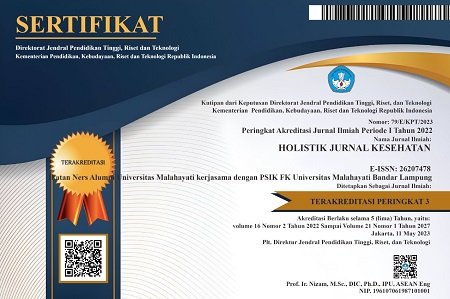Efektivitas pendampingan sebaya terhadap pengobatan antiretroviral (ARV) pada orang dengan HIV (ODHIV): Studi meta-analisis
Abstract
Background: Adherence to antiretroviral (ARV) therapy is the key to successful treatment in people living with HIV (PLHIV), characterized by suppressed HIV viral load. To ensure that PLHIV is obedient and prevent loss to follow-up, WHO (2016) proposes several ways, one of which is peer support. Peer support is considered effective to help PLHIV overcome psychosocial barriers to achieving a quality life.
Purpose: A meta-analysis study was conducted to obtain conclusions on the effect of peer support on ARV therapy adherence in people living with HIV.
Method: Database searches were carried out in March – June 2022 through PubMed, DOAJ, PLoS ONE, and Google Scholar. The systematic review was carried out using PRISMA (preferred reporting items for systematic review and meta-analysis).
Results: A total of 8 studies were included in the meta-analysis and analyzed separately using aRR and aOR risk estimation. In both risk estimates, peer support affects adherence to ARV therapy by aRR = 1.27 (95% CI = 1.13 – 1.44; P = 0.0001) and aOR = 1.97 (95% CI = 1, 16 – 3.34; P = 0.01) and statistically significant. Both funnel plot of risk estimation shows a potential for publication bias, characterized by an asymmetric distribution between plots.
Conclusion: This finding indicates that peer support affects adherence to ARV therapy in people living with HIV. It suggested that peer support be integrated with health care so that their existence is sustainable and in line with the treatment of PLHIV.
Keywords: Peer support; Antiretroviral therapy; People living with HIV
Pendahuluan: Kepatuhan pengobatan antiretroviral (ARV) merupakan kunci keberhasilan pengobatan pada orang dengan HIV (ODHIV). Keberhasilan pengobatan ditandai dengan tersupresinya viral load HIV. Untuk memastikan ODHIV patuh dan mencegah terjadinya lost to follow-up, WHO (2016) mengusulkan beberapa cara yang salah satunya adalah pendampingan sebaya. Pendampingan sebaya dinilai efektif untuk membantu ODHIV mengatasi hambatan psikososial dan internal untuk mencapai hidup berkualitas.
Tujuan: Penelitian meta-analysis dilakukan untuk mendapatkan kesimpulan mengenai pengaruh pendampingan sebaya terhadap kepatuhan pengobatan ARV pada ODHIV.
Metode: Penelusuran database dilakukan pada Bulan Maret – Juni 2022 melalui PubMed, DOAJ, PLoS ONE, dan google scholar. Telaah sistematis dilakukan dengan menggunakan PRISMA (preferred reporting items for sistematic review and meta-analysis).
Hasil: Sebanyak 8 (delapan) penelitian masuk dalam meta-analysis dan dilakukan analisis secara terpisah dengan menggunakan estimasi risiko aRR dan aOR. Pada kedua estimasi risiko, pendampingan sebaya berpengaruh terhadap kepatuhan pengobatan ARV sebesar aRR = 1,27 (CI 95% = 1,13 – 1,44; P = 0,0001) dan aOR = 1,97 (CI 95% = 1,16 – 3,34; P = 0,01) dan bermakna secara statistik. Funnel plot kedua estimasi risiko menunjukkan ada potensi terjadinya bias publikasi yang ditandai dengan distribusi asimetris antar plot.
Simpulan:Hasil penelitian menunjukkan bahwa pendampingan sebaya berpengaruh terhadap kepatuhan pengobatan ARV pada ODHIV. Disarankan agar pendampingan sebaya terintegrasi dengan layanan pengobatan ARV agar berkesinambungan keberadaannya dan sejalan dengan pengobatan ODHIV.
Keywords
References
Addison, D., Baim-Lance, A., Suchman, L., Katz, B., Swain, C. A., Piersanti, K., Steinbock, C., Sawicki, S., Agins, B., Nash, D., & NYLinks Implementation Team. (2019). Factors Influencing the Successful Implementation of HIV Linkage and Retention Interventions in Healthcare Agencies Across New York State. AIDS Behav. Jan;23(Suppl 1):105-114.
Assefa, Y., Lynen, L., Kloos, H., Hill, P., Rasschaert, F., Hailemariam, D., Neilsen, G., & Van Damme, W. (2015). Brief Report: Long-term Outcomes and Their Determinants in Patients on Antiretroviral Treatment in Ethiopia, 2005/6-2011/12: A Retrospective Cohort Study. J Acquir Immune Defic Syndr. Dec 1;70(4):414-9.
Ayala, G., Sprague, L., Van Der Merwe, L. L., Thomas, R. M., Chang, J., Arreola, S., Davis, S. L. M., Taslim, A., Mienies, K., Nilo, A., Mworeko, L., Hikuam, F., de Leon Moreno, C. G., & Izazola-Licea, J. A.. (2021). Peer- and community-led responses to HIV: A scoping review. PLoS One. Dec 1;16(12):e0260555.
Berg, R. C., Page, S., & Øgård-Repål, A. (2021). The effectiveness of peer-support for people living with HIV: A systematic review and meta-analysis. PLoS One. Jun 17;16(6):e0252623.
British HIV Association. (2018). Standards of Care for People Living with HIV. London: In British HIV Association.
Bolsewicz, K., Debattista, J., Vallely, A., Whittaker, A., & Fitzgerald, L. (2015). Factors associated with antiretroviral treatment uptake and adherence: a review. Perspectives from Australia, Canada, and the United Kingdom. AIDS Care. 27(12):1429-38.
Bonner, K., Mezochow, A., Robert,s T., Ford, N., & Cohn, J. (2013). Viral load monitoring as a tool to reinforce adherence: a systematic review. J Acquir Immune Defic Syndr. Sep 1;64(1):74-8.
Boucher, L. M., Liddy, C., Mihan, A., & Kendall, C. (2020). Peer-led self-management interventions and adherence to antiretroviral therapy among people living with HIV: A systematic review. AIDS Behav. Apr;24(4):998-1022.
Campbell, L., Masquillier, C., Thunnissen, E., Ariyo, E., Tabana, H., Sematlane, N., Delport, A., Dube, L. T., Knight, L., Flechner, T. K., & Wouters, E. (2020). Social and structural determinants of household support for ART adherence in low- and middle-income countries: a systematic review. Int J Environ Res Public Health. May 27;17(11):3808.
Carvalho, P. P., Barroso, S. M., Coelho, H. C., & Penaforte, F. R. O. (2019). Factors associated with antiretroviral therapy adherence in adults: an integrative review of literature. Cien Saude Colet. Jul 22;24(7):2543-2555.
Chaiyachati, K. H., Ogbuoji, O., Price, M., Suthar, A. B., Negussie, E. K., & Bärnighausen, T. (2014) Interventions to improve adherence to antiretroviral therapy: a rapid systematic review. AIDS. Mar;28 Suppl 2:S187-204.
Chekole, Y. A. & Tarekegn, D. (2021). HIV-related perceived stigma and associated factors among patients with HIV, Dilla, Ethiopia: A cross-sectional study. Ann Med Surg (Lond). Oct 8;71:102921.
Chimoyi, L., Hoffmann, C. J., Hausler, H., Ndini, P., Rabothata, I., Daniels-Felix, D., Olivier, A. J., Fielding, K., Charalambous, S., & Chetty-Makkan, C. M. (2021). HIV-related stigma and uptake of antiretroviral treatment among incarcerated individuals living with HIV/AIDS in South African correctional settings: A mixed methods analysis. PLoS One. Jul 30;16(7):e0254975.
Decroo, T., Koole, O., Remartinez, D., Dos Santos, N., Dezembro, S., Jofrisse, M., Rasschaert, F., Biot, M., & Laga, M. (2014). Four-year retention and risk factors for attrition among members of community ART groups in Tete, Mozambique. Trop Med Int Health. May;19(5):514-21.
Denison, J. A., Burke, V. M., Miti, S., Nonyane, B. A. S., Frimpong, C., Merrill, K. G., Abrams, E. A., & Mwansa, J. K. (2020). Project YES! Youth Engaging for Success: A randomized controlled trial assessing the impact of a clinic-based peer mentoring program on viral suppression, adherence and internalized stigma among HIV-positive youth (15-24 years) in Ndola, Zambia. PLoS One. Apr 2;15(4):e0230703. doi: 10.1371/journal.pone.0230703. Erratum in: PLoS One. 2020 Apr 23;15(4):e0232488.
Dommaraju, S., Hagey, J., Odeny, T. A., Okaka, S., Kadima, J., Bukusi, E. A., Cohen, C. R., Kwena, Z., Eshun-Wilson, I., & Geng, E. (2021). Preferences of people living with HIV for differentiated care models in Kenya: A discrete choice experiment. PLoS One. Aug 25;16(8):e0255650.
Elul, B., Basinga, P., Nuwagaba-Biribonwoha, H., Saito, S., Horowitz, D., Nash, D., Mugabo, J., Mugisha, V., Rugigana, E., Nkunda, R., & Asiimwe, A. (2013). High levels of adherence and viral suppression in a nationally representative sample of HIV-infected adults on antiretroviral therapy for 6, 12 and 18 months in Rwanda. PLoS One. 8(1):e53586.
Fatti, G., Mothibi, E., Shaikh, N., & Grimwood, A. (2016). Improved long-term antiretroviral treatment outcomes amongst patients receiving community-based adherence support in South Africa. AIDS Care. Nov;28(11):1365-72.
Franke, M. F., Kaigamba, F., Socci, A. R., Hakizamungu, M., Patel, A., Bagiruwigize, E., Niyigena, P., Walker, K. D., Epino, H., Binagwaho, A., Mukherjee, J., Farmer, P. E., & Rich, M. L. (2013). Improved retention associated with community-based accompaniment for antiretroviral therapy delivery in rural Rwanda. Clin Infect Dis. May;56(9):1319-26.
Higgins, J. P. T., Thomas, J., Chandler, J., Cumpston, M., Li, T., Page, M. J., & Welch, V. A. (editors). (2022). Cochrane Handbook for Systematic Reviews of Interventions version 6.3 (updated February 2022). Cochrane. Available from www.training.cochrane.org/handbook.
Igumbor, J. O., Scheepers, E., Ebrahim, R., Jason, A., & Grimwood, A. (2011). An evaluation of the impact of a community-based adherence support programme on ART outcomes in selected government HIV treatment sites in South Africa. AIDS Care. Feb;23(2):231-6.
Kagee, A. & Nel, A. (2012). Assessing the association between self-report items for HIV pill adherence and biological measures. AIDS Care. 24(11):1448-52.
Kanters, S., Park, J. J., Chan, K., Socias, M. E., Ford, N., Forrest, J. I., Thorlund, K., Nachega, J. B., & Mills, E. J. (2017). Interventions to improve adherence to antiretroviral therapy: a systematic review and network meta-analysis. Lancet HIV. Jan;4(1):e31-e40.
Karver, T.S., Barrington, C., Donastorg, Y. Perez, M., Gomez, H., Page, K. R., Celentano, D., Smith, K. C., & Kerrigan, D. (2022). Exploring peer navigation and support in the quality of HIV care experiences of female sex workers in the Dominican Republic. BMC Health Serv Res. 2022: 22, 56.
Kementerian Kesehatan Republik Indonesia. (2014). Pedoman Pengobatan Obat Antiretroviral (ARV) (Nomor 87 Tahun 2014; Issue c). Peraturan Menteri Kesehatan RI (Permenkes). Jakarta.
Kementerian Kesehatan Republik Indonesia. (2019). Pedoman Nasional Pelayanan Kedokteran Tata Laksana HIV (Nomor HK.01.07/MENKES/90/2019). Keputusan Menteri Kesehatan RI (Kepmenkes). Jakarta.
Kementerian Kesehatan Republik Indonesia. (2022). Laporan Perkembangan HIV AIDS dan Penyakit Menular Seksual (PIMS) Triwulan IV Tahun 2022. Jakarta.
Kemp, C. G., Lipira, L., Huh, D., Nevin, P. E., Turan, J. M., Simoni, J. M., Cohn, S. E., Bahk, M., Berzins, B., Andrasik, M., Mugavero, M. J., & Rao, D. (2019). HIV stigma and viral load among African-American women receiving treatment for HIV. AIDS. Jul 15;33(9):1511-1519.
Kioko, M. T. & Pertet, A. M. (2017). Factors contributing to antiretroviral drug adherence among adults living with HIV or AIDS in a Kenyan rural community. Afr J Prim Health Care Fam Med. Jul 31;9(1):e1-e7.
Kipp, W., Konde-Lule, J., Saunders, L. D., Alibhai, A., Houston, S., Rubaale, T., Senthilselvan, A., & Okech-Ojony, J. (2012). Antiretroviral treatment for HIV in rural Uganda: two-year treatment outcomes of a prospective health centre/community-based and hospital-based cohort. PLoS One. 7(7):e40902.
Lailulo, Y., Kitenge, M., Jaffer, S., Aluko, O., & Nyasulu, P. S. (2020). Factors associated with antiretroviral treatment failure among people living with HIV on antiretroviral therapy in resource-poor settings: a systematic review and metaanalysis. Syst Rev. Dec 12;9(1):292.
Luque-Fernandez, M. A., Van Cutsem, G., Goemaere, E., Hilderbrand, K., Schomaker, M., Mantangana, N., Mathee, S., Dubula, V., Ford, N., Hernán, M. A., & Boulle, A. (2013). Effectiveness of patient adherence groups as a model of care for stable patients on antiretroviral therapy in Khayelitsha, Cape Town, South Africa. PLoS One. 8(2):e56088.
Mi, T., Li, X., Zhou, G., Qiao, S., Shen, Z., & Zhou, Y. (2020). HIV Disclosure to Family Members and Medication Adherence: Role of Social Support and Self-efficacy. AIDS Behav. Jan;24(1):45-54.
Mills, E. J., Nachega, J. B., Bangsberg, D. R., Singh, S., Rachlis, B., Wu, P., Wilson, K., Buchan, I., Gill, C. J., & Cooper, C. (2006). Adherence to HAART: a systematic review of developed and developing nation patient-reported barriers and facilitators. PLoS Med. Nov;3(11):e438.
Muñoz, M., Bayona, J., Sanchez, E., Arevalo, J., Sebastian, J. L., Arteaga, F., Guerra, D., Zeladita, J., Espiritu, B., Wong, M., Caldas, A., & Shin, S. (2011). Matching social support to individual needs: a community-based intervention to improve HIV treatment adherence in a resource-poor setting. AIDS Behav. Oct;15(7):1454-64.
National Association of People With HIV Australia. (2020). Australian HIV Peer Support Standards. Australia. www.napwha.org.au
Ncama, B. P., McInerney, P. A., Bhengu, B. R., Corless, I. B., Wantland, D. J., Nicholas, P. K., McGibbon, C. A., & Davis, S. M. (2008) Social support and medication adherence in HIV disease in KwaZulu-Natal, South Africa. Int J Nurs Stud. Dec;45(12):1757-63.
Nyoni, T., Sallah, Y. H., Okumu, M., Byansi, W., Lipsey, K., & Small, E. (2020). The effectiveness of treatment supporter interventions in antiretroviral treatment adherence in sub-Saharan Africa: a systematic review and meta-Analysis. AIDS Care. May;32(Suppl 2):214-227.
Office of AIDS Research Advisory Council. (2021). Guidelines for the Use of Antiretroviral Agents in Adults and Adolescents with HIV (Vol. 40, Issue Build 29393). USA.
Oh, D. L., Sarafian, F., Silvestre, A., Brown, T., Jacobson, L., Badri, S., & Detels, R. (2009). Evaluation of adherence and factors affecting adherence to combination antiretroviral therapy among White, Hispanic, and Black men in the MACS Cohort. J Acquir Immune Defic Syndr. Oct 1;52(2):290-3.
Penn, A. W., Azman, H., Horvath, H., Taylor, K. D., Hickey, M. D., Rajan, J., Negussie, E. K., Doherty, M., & Rutherford, G. W. (2018). Supportive interventions to improve retention on ART in people with HIV in low- and middle-income countries: A systematic review. PLoS One. Dec 14;13(12):e0208814.
Positively, U.K. (2016). National Standards for Peer Support in HIV 2 Production. London.
Prochazka, M., Otero, L., Konda, K. A., González-Lagos, E., Echevarría, J., & Gotuzzo, E. (2018). Patient-nominated supporters as facilitators for engagement in HIV care in a referral hospital in Peru: A retrospective cohort study. PLoS One. 13(4): e0195389.
Rhodes, S. D. (Editor). (2014). Innovations in HIV Prevention Research and Practice through Community Engagement. New York: Springer Nature; ISBN 978-1-4939-0900-1 (eBook).
Spaan, P., Van Luenen, S., Garnefski, N., & Kraaij, V. (2020). Psychosocial interventions enhance HIV medication adherence: A systematic review and meta-analysis. J Health Psychol. Sep;25(10-11):1326-1340.
Sunguti, J. L., Tiam, A., Masaba, R., Waweru, M., Kose, J., Odionyi, J., Matu, L., & Mwangi, E. (2019). Assessing treatment outcomes among peer educators living with HIV in Kenya. PLoS One. Jun 27;14(6):e0218774.
Tchakoute, C. T., Rhee, S. Y., Hare, C. B., Shafer, R. W., & Sainani, K. (2022). Adherence to contemporary antiretroviral treatment regimens and impact on immunological and virologic outcomes in a US healthcare system. PLoS ONE. 17(2), 1–12.
Torpey, K. E., Kabaso, M. E., Mutale, L. N., Kamanga, M. K., Mwango, A. J., Simpungwe, J., Suzuki, C., & Mukadi, Y. D. (2008). Adherence support workers: a way to address human resource constraints in antiretroviral treatment programs in the public health setting in Zambia. PLoS One. May 21;3(5):e2204.
Unites Nations Programme on HIV/AIDS. (2021). UNAIDS data 2021. Geneve
World Health Organization. (2016). Consolidated guidelines on the use of antiretroviral drugs for treating and preventing HIV infection: recommendations for a public health approach - 2nd edition. Geneve.
Yehia, B. R., Stewart, L., Momplaisir, F., Mody, A., Holtzman, C. W., Jacobs, L. M., Hines, J., Mounzer, K., Glanz, K., Metlay, J. P., & Shea, J. A. (2015). Barriers and facilitators to patient retention in HIV care. BMC Infect Dis. Jun 28;15:246.
Zachariah, R., Teck, R., Buhendwa, L., Fitzerland, M., Labana, S., Chinji, C., Humblet, P., & Harries, A. D. (2007). Community support is associated with better antiretroviral treatment outcomes in a resource-limited rural district in Malawi. Trans R Soc Trop Med Hyg. Jan;101(1):79-84.
DOI: https://doi.org/10.33024/hjk.v16i8.8418
Data citation
None
Refbacks
- There are currently no refbacks.
Copyright (c) 2023 Holistik Jurnal Kesehatan

This work is licensed under a Creative Commons Attribution-NonCommercial 4.0 International License.














